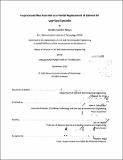Unprocessed rice husk ash as a partial replacement of cement for low-cost concrete
Author(s)
Brown, Dorothy Kamilah
DownloadFull printable version (11.11Mb)
Other Contributors
Massachusetts Institute of Technology. Dept. of Civil and Environmental Engineering.
Advisor
John A. Ochsendorf.
Terms of use
Metadata
Show full item recordAbstract
Cement is a very valuable commodity as it can be used to construct structurally sound buildings and infrastructure. However, in many developing countries cement is expensive due to the unavailability of local resources to produce enough cement in-country to meet the demand for this material, and therefore it has to be imported. In rice-producing countries rice husk ash-a material naturally high in silica-can be used as a supplementary cementitious material and can substitute a portion of Portland cement in concrete without sacrificing the compressive strength. This study investigates the use of Cambodian rice husk ash in 10, 20 and 30% replacements of Portland cement by mass in mortar, without optimization of the ash by controlled burning. Five ashes collected from different sources in Cambodia were assessed for their suitability for use in rural Cambodian construction via compression strength testing of 2" (50 mm) mortar cubes. A 20% replacement of unprocessed Cambodian rice husk ash was deemed appropriate for use in small-scale, rural structural applications. Low-tech methods of grinding the ash were also investigated and were found to drastically increase the compressive strength of RHA-cement mortars in comparison to mortars made with unground RHA.
Description
Thesis (S.M.)--Massachusetts Institute of Technology, Dept. of Civil and Environmental Engineering, 2012. Cataloged from PDF version of thesis. Includes bibliographical references (p. 73-76).
Date issued
2012Department
Massachusetts Institute of Technology. Department of Civil and Environmental EngineeringPublisher
Massachusetts Institute of Technology
Keywords
Civil and Environmental Engineering.